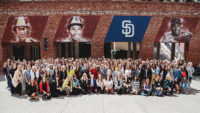As of 2023, women make up only 29.5% of all salespeople in the U.S. while 70.5% are men. Similarly, according to the National Association of Manufacturing (NAM), women make up about 29% of the manufacturing workforce — quite a rise from year’s past — but still a significant minority compared to men.
The PHCP-PVF industry is certainly still male-dominated, but there are significant improvements being made. Now more than ever before, PHCP manufacturers, distributors and associations are taking a hard look inside to achieve better representation and diversity throughout out industry. Adding more diversity to the workforce is only part of the battle; women — and employees in general — need to be engaged with your organization and empowered to grow their careers.
Rinnai America Corporation is a perfect example of a company investing in the development of its female employees. Back in 2020 after receiving less than stellar employee engagement scores from women on its annual Employee Engagement Survey, Rinnai President Frank Windsor knew something needed to change. He turned to Alexis Davis, vice president, human resources, to dig deeper to gain better insight into the experiences women were having at the company.
“Frank was passionate about closing the experience gap,” Davis says. “It was not about strategy or a superficial attempt to bring in diversity and inclusion; it was authentic and intentional from the start.”
Davis took the challenge head on, working alongside Misty Bowden, quality director, and Lori Page, senior marketing manager to conduct a women’s’ focus group to identify the missing pieces for women at Rinnai.
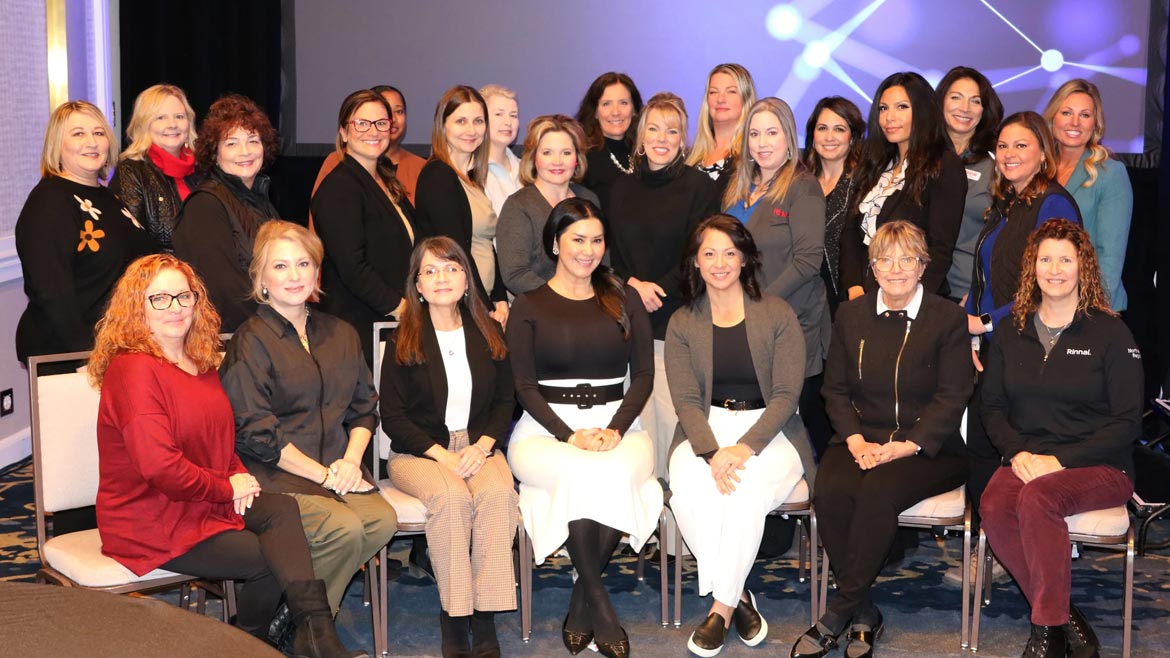
Women in Manufacturing (WIM) – Rinnai is also a participant in WIM. Pictured above, Rinnai team members pose for a photo at the 2023 WIM Conference in San Diego. Image courtesy of Rinnai
“After the focus group, we walked away with some truly impactful drivers to help ensure the women of Rinnai felt encouraged, engaged and recognized,” Davis says. “From there, the Women’s Engagement Council (WEC) was born as representation for Women of Rinnai (WOR).”
Davis notes that just a year later on the next annual employee review, the engagement scores among women at Rinnai has achieved its highest demographic hike and exceeded global norms specific to engagement among women.
Amanda Anderson, human resource manager, points out that the first WEC meeting was extremely productive. “We focused on facts vs. feelings,” she says. “Sometimes we can be clouded by our feelings, so we focused on establishing what is factual for women in our organization and using that to learn how to better support them.”
Continuous allyship
From the start of Rinnai’s WEC, the company’s executive leadership wanted to be involved and were incredibly supportive.
“We had members of our executive staff who wanted to sponsor us and be involved,” Anderson says. “They helped us through the logistics of building a Charter, who do we need to participate, what can we do for women in our local community, etc.”
The women’s group was adamant about including men in the process. “We didn’t want to create something that was leaving the men out,” Anderson says. “We would hold focus groups and educational sessions and invite the men of Rinnai, along with their wives.”
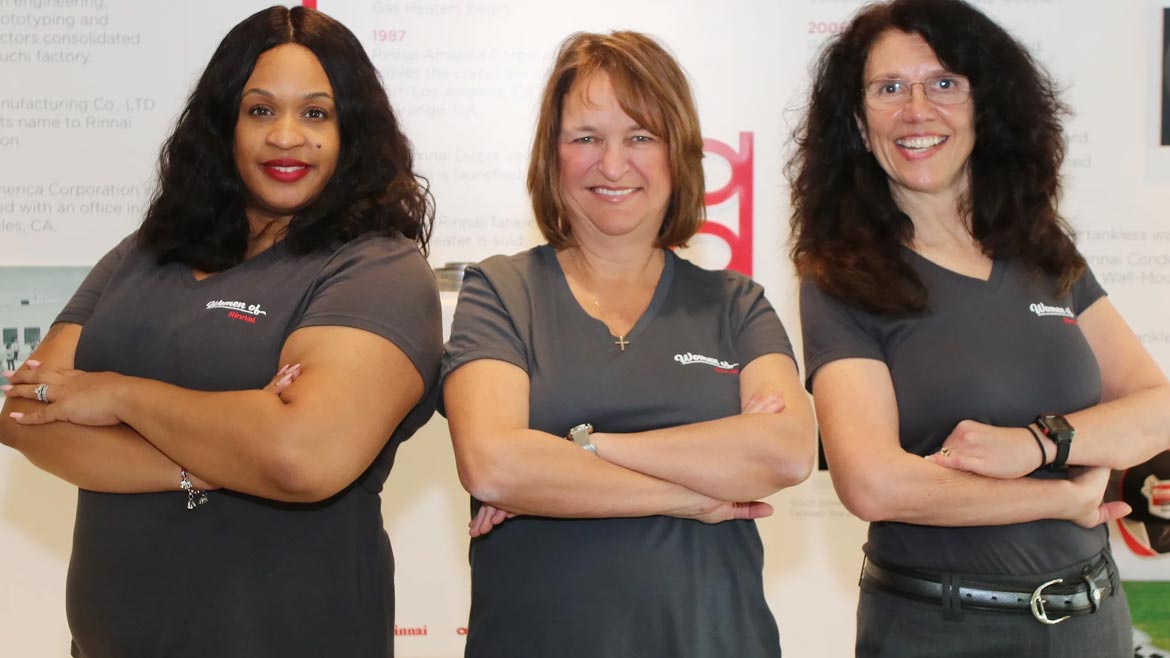
Rinnai Women Executives: Alexis Davis, Vice President of HR, Shelley Kiley, Vice President of Operations, Renee Eddy, Chief Innovation Officer Image courtesy of Rinnai
Wanda Little, environmental, health and safety manager, says including men in these conversations is vital. “Sometimes men just aren’t aware of the challenges or experiences we have as women,” she says. “So it’s just a matter of education; we want them to be included in the process and learn alongside us.”
Because of the support from Rinnai’s leadership and the hard work from the original council members, Rinnai’s WEC has grown from a small group of five women to now having representation from virtually every department throughout the company.
Page says that the support from Rinnai’s executive team was evident from the beginning. “From our very first meeting, the men sat down and truly wanted to hear us out,” she says. “They wanted to know where we thought the gaps were and what the challenges are that women faced at Rinnai; I was blown away — they have been champions for us every step of the way.”
Davis agrees, adding that the support from the executive level has helped the council grow is footprint. “We knew in order for this council to grow we needed more people,” Davis says. “We sought to bring in not just leaders, but also individual contributors that represent all facets of our business with a diversity of tenure, experience, demographics, etc.”
Advise and empower
The Rinnai Women’s Engagement Council (WEC) is intended to research, develop, coordinate and execute solutions and strategies designed to enhance the experience of Women of Rinnai (WOR). These efforts are designed to attract, build, retain and engage top talent, inclusive of women. The WEC seeks to:
- Identify initiatives to enhance the engagement experience for female associates through the alignment of Rinnai’s Cultural Beliefs, support our strategic priority of Becoming a Talent Magnet, and sustaining the brand promise of Creating a Healthier Way of Living.
- Advise the Executive Sponsors on what programs, initiatives, and investments are recommended to strengthen the engagement experience of women.
- Execute strategies by collaborating with various women and focus groups within Rinnai, professional women's networks, partners, and WEC members to coordinate activities recommended to achieve defined outcomes.
Shelley Kiley, vice president of operations summarizes the goal of the WEC by saying it’s about identifying what experiences the council can provide for women. “Subsequently, we want to be able to attract and retain top talent,” she adds.
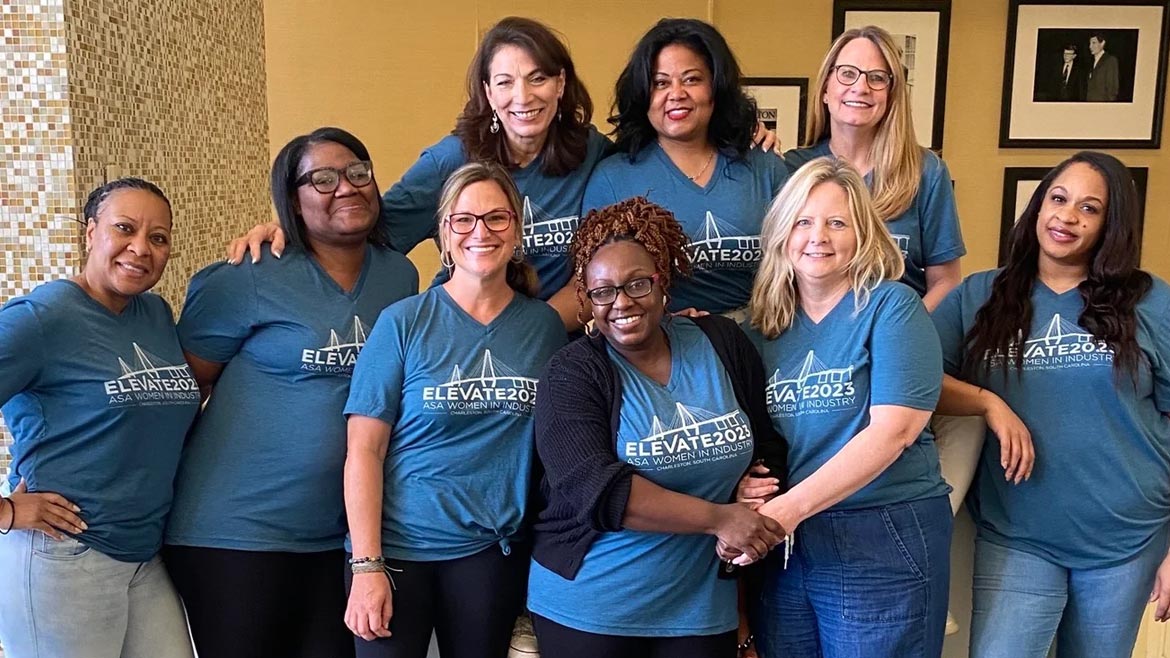
ASA Events: Rinnai team members enjoy the 2023 ASA Elevate Conference in Charlotte. Image courtesy of Rinnai
Outside of Rinnai, the WEC seeks to empower women throughout the PHCP industry and the company’s local community. Davis and Page serve as volunteers on the American Supply Association’s (ASA) Women in Industry Division Board, and Page is on the ASA Education Committee.
“Being engaged with these groups helps up learn how we can initiate change for the industry as a whole,” Page says. “We are able to constantly evolve our group because we are learning these lessons in real-time from members of the industry.”
The WEC partners with several local women’s shelters in Georgia, collecting clothes and items to help women feel empowered to succeed. Some members of the WEC are also involved with the Next Generation Manufacturing organization based in Georgia.
“We take many of our younger women who are just getting into manufacturing to these events to expose them to various industries and see that there are women in this field,” Kiley says. “There is energy and excitement in manufacturing, and we want to expose women to that.”
Bowden points out that another principle of the WEC is to normalize women’s issues and empower women to be proud of themselves. “As women, we are taught not to be aggressive or forward,” she says. “The WEC has helped to normalize lifting women up throughout Rinnai. We are each other’s ‘hype women,’ since hyping ourselves up is not something that comes naturally to most women.”
International Women’s Day event
For the past three years, Rinnai’s WEC has hosted an annual event celebrating International Women’s Day each March. Everyone at Rinnai is invited, both men and women, and the latest event in 2023 drew more than 200 people.
In addition to development breakouts sessions, the events are also made up of fun activities like painting and bowling along with keynote speeches from some impressive guests — Collette V. Smith, the NFL’s first black female coach from the New York Jets and a Supreme Court Justice, Carla Wong McMillian, just to name a few.
“The power of networking has been huge for these events,” Davis points out. “We don’t have the budget for these type of speakers. Every person involved in the events has come to us through some connection made with someone involved with our WEC.”
Each year the International Women’s Day event includes some component that helps the local community as well.
For 2024, Rinnai had several women express their interest and desire to speak in front of large groups. Therefore, they will nurture that courage by having an internal group of women (and men) participate in several engaging panel discussions.
Dramatic boost in engagement
In the four short years that the WEC has invested in the Women of Rinnai, the company had seen a huge leap in engagement, and there is proof in the metrics.
Within the past 12 months, 50 percent of promotions throughout Rinnai were women. Additionally, the company now its first executive female in operations, Shelley Kiley. Rinnai also now has a female distribution center leader in its Griffin, Georgia DC.
“Back in 2020, only 8% of our executives are Rinnai were women,” Davis points out. “We have now doubled that percentage. And when it comes to women in leadership roles overall, we have grown that metric by 34%.”
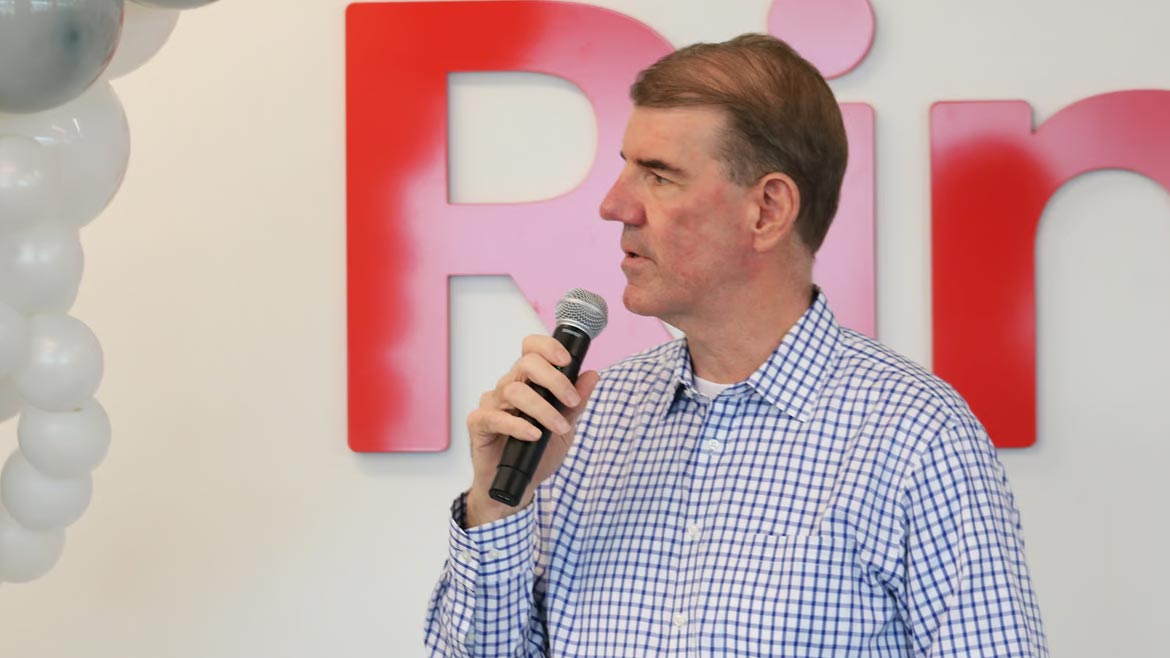
International Women’s Day 2023: Rinnai celebrates IWD 2023. President of Rinnai Americas, Frank Windsor
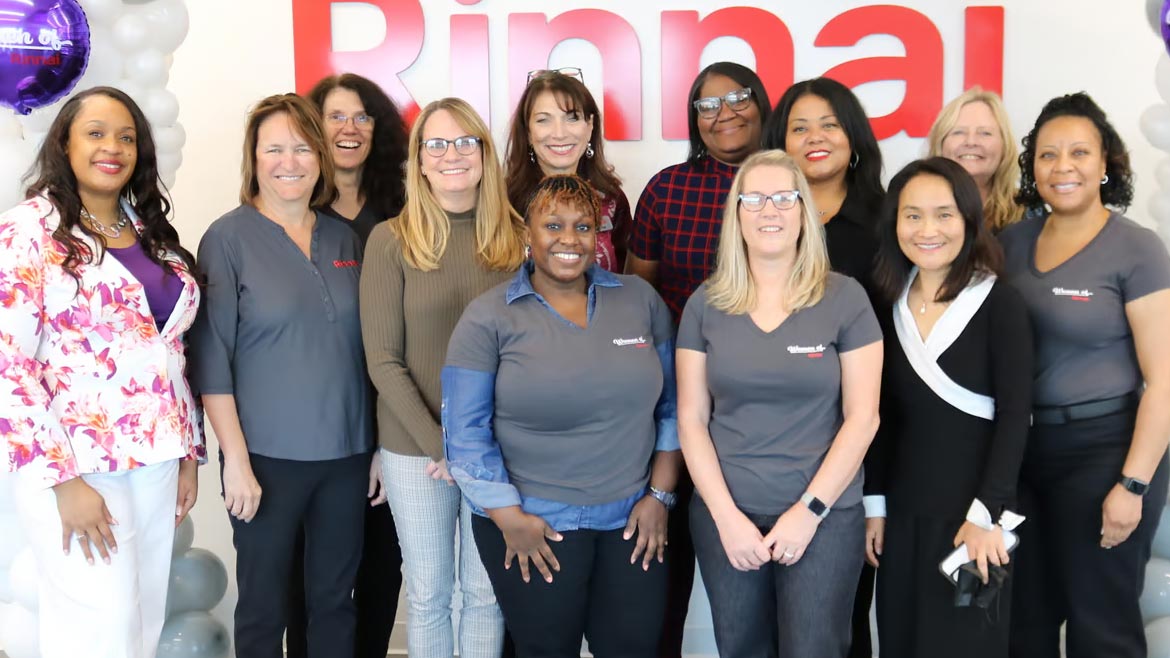
International Women’s Day 2023: Rinnai celebrates IWD 2023. Former council members.
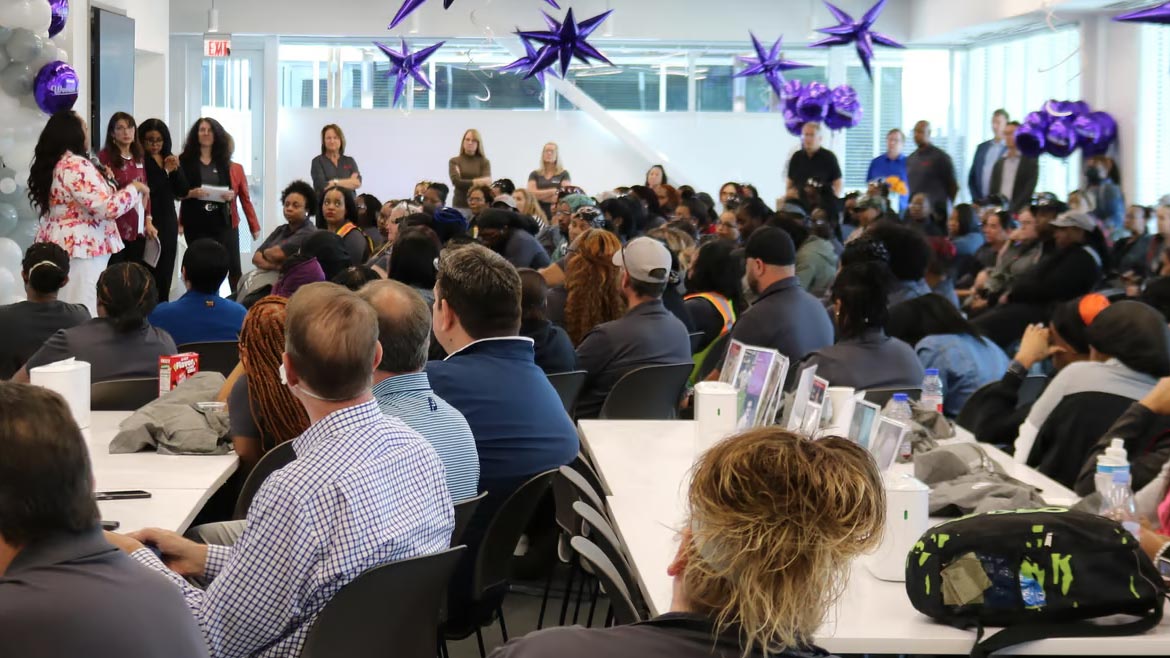
2023 in-person attendees of the Rinnai celebration of International Women's Day 2023.
Davis adds that the goal is never to meet a quota to reach surface-level diversity goals. “We’re seeking to bring people in who have a history of success and will bring innovative ideas,” she says. “We're also making intentional efforts to educate and eliminate biases during the hiring, promotion and development processes.”
Kiley agrees, adding that through the work of the WEC, the company has been able to empower talented women to step forward who maybe wouldn’t have several years ago. “We’ve found some ‘gems’ in our organization that we weren’t initially aware of,” she says. “Through talking with members of WEC or their now female leaders, these women have started to step forward to be interested in growth opportunities, and we’ve been able to place them in roles where they can start to excel and grow with the company.”
The council has also made an impact on individual women throughout the company. One prime example comes from Little, who was hired six years ago and at the time was the only female Manager of Operations at Rinnai.
“I’ve seen the company go from having one woman in this type of role, which was me, to now having a female vice president of operations and other women in leadership throughout the company,” she says. “Thanks to the WEC and Frank for supporting it, there are now numerous female mentors at Rinnai for women to look up to and to help navigate what it is to be a woman in manufacturing.”
Anderson adds that the company now makes an effort to seek out diversity in its hiring. “We are always focused on hiring the best of the best for the role,” she says. “And in order to do that, we are actively seeking out to diverse communities and groups. We want people with different backgrounds, beliefs, ethnicities, genders, etc. to make our company the most well-rounded it can be.”
Fostering growth; authenticity is key
Moving forward, Rinnai’s WEC plan to focus on the challenges specific to women in manufacturing and sales roles face at their organization.
“We’re in a male-dominated industry, especially when you look at sales and manufacturing roles,” Kiley says. “I think we need to dive deep into the challenges women face with these roles and how to help navigate those.”
Page agrees, adding that traditionally, women exclude themselves from these types of roles. “Oftentimes women don’t understand the level of opportunity they can have in sales or manufacturing,” she says. “We want to work with them to overcome obstacles and identify their areas of strength; women by nature build relationships, so I believe there is an area of opportunity to develop women in sales roles if we can help them conquer the challenges.”
When it comes to addressing challenges for women industry-wide, Davis says companies need to do better jobs analyzing data. “Attracting and retaining women has been a longstanding challenge in our industry,” she says. “Businesses need to look at demographics within their organization; turnover rates, promotion rates and engagement results are all good metrics to look at to learn how to retain women.”
One example Davis brings up is maternity programs or lack thereof. “The plumbing and heating business is essentially a 24/7 business,” she says. “Many traditional maternity programs are not equipped to support women. This is something Rinnai is taking very seriously this year.”
The group agrees that societal pressure falls on women to “do it all,” and companies need to address how they can better support women as they try to be leaders in their businesses and their homes.
Page shares some important advice for companies that want to get started better supporting their women. “It starts at the top,” she says. “Get your executive level to be champions for the issue. Women innately want to collaborate and be better, so if they feel they have the support to do so, they will make it happen.”
The group adds that using an employee engagement survey is a great place to start. “While building this group we also looked at our own biases that we carry as women,” Anderson says. “We can talk about the biases men carry towards men, but we also have our own that we need to address and again, look at fact vs. feeling.”
No matter where a company stands when it comes to diversity, inclusion and women’s engagement, the most important thing to move forward is being authentic.
“A lot of companies look at women’s issues and diversity and inclusion as an HR task,” Davis says. “It’s not an HR thing; it’s a company-wide issue. It has to be intentional, thoughtful and authentic. Employees can sense inauthenticity when it comes to diversity from a mile away; you cannot makes changes just to check a box. From the beginning of this journey at Rinnai is has been a genuine effort with support from the top which is why our WEC has been able to help the company in the ways that it has.”







